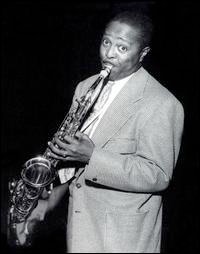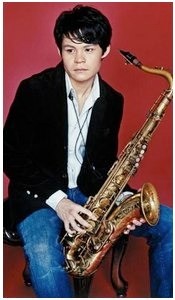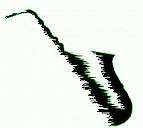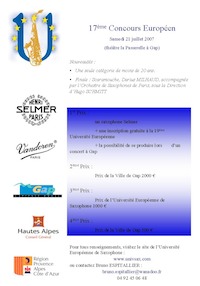December 2007
Association des Saxophonistes de France
I was just contacted by the webmaster of the A.SAX, France's saxophone association who pointed me to their new web site. Very impressive. Several interesting features including music and record reviews, and articles which may interest saxophonist interested in classical saxophone. There are also blogs from several Conservatoire saxophone classes.
The site is in French.
October 2007
Ornette Coleman Interview
The American Music Center has an interesting interview with Ornette Coleman on the NewMusicBox site. Worth checking out.
Link: http://www.newmusicbox.org/article.nmbx?id=5259
To TopJuly 2007
Louis Jordan anniversary
Today we celebrate Louis Jordan's birth date, 99 years ago (b. July 8, 1908 in Brinkley, AK, USA) .

Jordan was an important entertainer, singer as well as sax player who is regarded by many as an important link between early jazz / swing era big and rock'n'roll. as pointed out on powerline.com, Jordan recorded 57 rhythm and blues chart hits on Decca between 1942 and 1951.
He certainly deserves a new look which is what I intend to do soon. In the meantime, check out some recordings which you can hear on WBEZ's public radio website. Great stuff.R.I.P. Boots Randolph
The colorful Boots Randolph has passed away. Best known for his popular "Yakety Sax" died Tuesday July 2, 2007 after having suffered a cerebral hemorrhage on June 25.
No matter what might think about his musical stylings, Randolph was an interesting sax player who certainly influenced many a youngster into exploring the saxophone. His Yakety Sax as well as Paul Desmond's Take Five and Henri Mancini's The Pink Panther theme played by Plas Johnson must account for many sax players initiation to the instrument.
A number of obituaries can be found. Among them:
June 2007
And the Young Shall Inherit the World
Just read this review on Blogcritics Magazine about an amazing sounding young sax player's first recording. Robert MacGregor is his name and the recording is Refraction of Light (Black Tri Records).

It's actually a little scary to hear how such a young performer can sound so mature. And all the songs on this set are his own compositions, so he's also a creative type. Definitely a sax player to keep an eye on for the future.
You can hear clips from his upcoming record on his web site at:
King - Bird = Grafton sax
Here's a neat little clip of Peter King playing on Charles Parker's Grafton sax.
King sound's great as he demonstrates the alto for an auction held in London.
http://www.youtube.com/watch?v=ISadfOcJn3A
May 2007
New Review of Jazz Recording
Just added the first of what will be several reviews, of recordings or music.
In this case I'm talking about a Zoot Sims record which I just purchased: 'Hawthorn Nights'.
To read the review just follow this link:
Review: Hawthorn Nights [Original Jazz Classics, 2004]
European Competition for young sax players
I just received this announcement for a young players competition at Gap, France.
You can get further information by visiting their web site:
Notes flying off the page
Well, actually in this case, the notes are flying on the page.
Interesting youtube clip of John Coltrane's Giant Steps.
Trust me, it'll make your day.
http://www.youtube.com/watch?v=2kotK9FNEYU
Michael Brecker's last session
Just spotted this great promotion clip for the late Michael Brecker's last recording session which will be put out in Pilgrimage, which is set to be released in a few weeks.
Features interviews with the other artists who recorded the session which includes, Herbie Hancock, Pat Metheny, John Patitucci, Brad Mehldau and Jack DeJohnnette.
Worth a look-see.
ftp://telmedia.telarc.com/headsup/VIDEO/Pilgrimage/Brecker-Final-EPK.html
More details on the record is available on the Heads Up site. The page includes sound clips of the record.
http://headsup.com/albums/3095.asp
Saxo-trivia
Here's a little factoid, for you.
What do Ray Charles, Andrea Bocelli, David Bowie, Rudy Vallee and Lionel Richie have in common ?
Well of course, they're all singers !! That's too easy. Let's add these names to the list:
Bob Hope, Kareem Abdul-Jabbar, Bill Clinton.
You guessed it !
They have all played sax at some time in their lives. How cool is that. Not surprising tough, seen as the sax is such a cool instrument to play in the first place. But we already knew that, didn't we!
Let me know of any other famous saxophone amateurs.
R.I.P. Alvin Batiste
Just learned of the passing of clarinetist and sometimes saxophone player Alvin Batiste.
Among other things, he played with Ray Charles, Cannonball Adderley, Ornette Coleman, Ernie Wilkins and the Clarinet Summit.
Citing from the New York Times article:
"Mr. Batiste was born in New Orleans in 1932. He was considered one of the founders of the city’s modern jazz scene and wrote for and toured with Billy Cobham and Cannonball Adderley.
He was a longtime teacher at Southern University in Baton Rouge, La., where he created his own jazz institute, one of the first of its kind in the country; he also taught jazz at the New Orleans Center for Creative Arts. His students included Mr. Marsalis, Donald Harrison, Kent Jordan, Michael Ward, Herlin Riley, Charlie Singleton and Woodie Douglas."
LINK:
http://www.nytimes.com/2007/05/07/arts/07batiste.html?ref=music
Transcription Turn-around
As classical saxophonist all know, a lot of our upbringing has centered around the use of transcriptions. The sax being such a young instrument in the global history of music, the early pioneers had to create their own sources of material to perform. Even before being able to get composers to write new music for their instrument, they needed something to show off the capabilities of the saxophone. Hence the use and necessity of transcriptions.
My generation was brought up playing transcriptions by Marcel Mule , Sigurd Rascher or Larry Teal among others. I recall my first experience of playing in quartet reading Larry Teal's collection of 10 Saxophone Quartets or in a duet setting with his transcription of Bach's 2-part inventions. Mule's trancription of classical sonatas also come to mind.
These were necessary at the time to let young players get a taste of the masters and to have enough material to make an interesting program for concerts. There just wasn't a lot of original material available to us back then.
Flock to a sax quartet
An interesting concept for a saxophone quartet piece is what Jason Freeman of Georgia Tech is presently working on. His new work, Flock, is set to be previewed this week.
"Working with programmers, a computer vision expert and an adventurous saxophone quartet, Freeman is creating a work in which a restless audience is very literally part of the music. Listeners and musicians are encouraged to wander around the performance space during the concert, while digital cameras track their motion."
Read the full article at Wired.com.
Freeman also has a site discussing his work: http://music.columbia.edu/~jason/flock/
My little blurb for today
I don't have much time today, so I'll just mention that the Jacques Ibert's Concertino da Camera's first movement was premiered on this day, May 2, 1935 in Paris.
That's just a mere 72 years ago.
April 2007
Great ressource
I just stumbled onto another great resource for anyone interested in the classical saxophone field.
Jean-Marie Londeix, who we all know as not only a great virtuoso, a compelling teacher but also a leader in saxophone research. He has created an Association of the European Center for Saxophone (E.C.S.) which is based in Bordeaux, France.
The E.C.S. is an archive of material which Londeix has donated to the city of Bordeaux. Anyone who knows Londeix will be well aware that his research has been extensive and exhaustive. So one can only imagine the depth of this source of material.
To accompany this archive is the creation of a web site where Londeix is a member of an international editorial board which includes Paul Bro (Professor, Indiana State University, Terre Haute, Indiana, USA) and William Street (Professor, University of Alberta, Edmonton, Alberta, Canada).
The site, SaxAmE (The Saxophone in American and Europe) is a repository of a number of interesting material including letters from prominent composers and saxophonists, lists of books, music and other topics. There are also a number of photos and some sound clips, including performances by Londeix.
What a web site should be like
All I have to say is WOW !
I just visited the website of composer Jacob ter Veldhuis.
And all I have to say is WOW !
This is what a composer website should be like. I usually skip over the often innocuous, insipid flash intros that pepper the internet these days. But this time, I was compelled to stick it out. And it was well worth the look see. The flash is a compelling introduction to a great looking website full of information and web media, be they graphic, audio or video clips. Simple navigation and beautiful layout. What more can you ask for?
Well great content helps. And JacobTV, as he refers to himself on the web, provides this with his personal style of music making.
Jacob ter Veldhuis is well known in saxophone circles for pieces for sax & boombox (or ghetto blasters if you prefer). My first encounter with his music was a performance of Blast It by Arno Bornkamp at the Montreal World Saxophone Congress in 2000. There is a clip of the piece in the Audio section of the site. A definite crowd pleaser.
Subway Bell(s) and whistles
Just read an interesting article at the Washington Post. Some of you may have heard of the stunt played out by Joshua Bell (you know, the Red Violin guy) playing in a subway station.
Fascinating story with video clips. Also includes an audio of the full 40 + minutes of Bell's performance.
The results makes one wonder on the pertinence all classical musicians have in today's rushed world.
You can make your own judgment after reading this:
http://www.washingtonpost.com/wp-dyn/content/article/2007/04/04/AR2007040401721.html?hpid=artslot
(Thanks to Alan Holley on the NASA list for pointing me to this page. I had been hearing about it but had not yet seen it until his mentioning it.)Saxophone and the orchestra
Ornette Coleman wins the Pulitzer
It's been announced that Ornette Coleman has just been awarded the 2007 Pulitzer Prize in Music.
The prize is for a distinguished musical composition by an American composer that has had its first performance or recording in the United States during the previous year. This is the first time in the history of the Pulitzer Prize in Music was awarded for a recording.
The Pulitzer Prize have also awarded John Coltrane a posthumous special citation "for his masterful improvisation, supreme musicianship and iconic centrality to the history of jazz." (from the 2007 page of http://www.pulitzer.org/ )
Links:
Where in the World is...
Thought I'd bring up a pet peeve of mine. Nothing like a little international intrigue to start things off on this site. [insert a little smile here]
Where is the World Saxophone Congress. Well, actually, it's more about who is in the World Saxophone Congress International Comity? Or should that be what is the WSCIC?
For those of you who do not know about this organization [shame on you], It's an international conference which is held every three years. The last conference was held in Slovenia last year and the next his scheduled to be held in Bangkok. (Here is a link to the Slovenia site)
Having been personally involved in organizing one of these events, here in Montreal in 2000 (you can visit our site which is still up at XII World Saxophone Congress) I can attest to the interest and importance these events hold for all saxophonists, especially those who perform in the "classical" style. Also to the hard work and dedication which is needed to pull these things off.
[Let me take a moment to salute all those courageous souls who are crazy enough, about thesaxophone, to dedicate themselves in these endeavors.]Here's a little history about the Congress. The first one was organized by Paul Brodie and Eugene Rousseau and was held in Chicago in 1969 with a few dozen participants from several countries (Donald Sinta was elected chairman at the time). It was followed the next year with another meeting, also held in Chicago. It has been held ever since at varying intervals to finally end up today being a very large assembly of over a thousand participants from all over the world.
Welcome to the first blog
Hi all,
I'm starting this blog were I intend to talk about my great passion: the saxophone. I've been playing the instrument more years than I care to mention, and I still find a fascination with the possiblities of this great instrument.
But I don't intend discussing the technical aspects of performance, although that may come up from time to time. What I am more interested in doing is to investigate the music itself. And that won't necesseraly be limited to uniquely saxophone pieces, but may cover other music by composers who have worked with the saxophone in some way or other.
Most people associate the saxophone with jazz. This is of course quite understandable. Contributions by so many great talents in the jazz field, such as Coleman Hawkins, Charlie Parker, John Coltrane, et al. cannot be denied. But the saxophone is so much more and has touched so many more musical styles and events.
For those who do not know, the name of the blog: Mule's Rasch, is my little tribute to the father's of 20th century classical saxophone, Marcel Mule and Sigurd Rascher. These two gentlement have the merit of being the pioneers of modern classical saxophone performance. They have contributed not only through their performance, but also through their teachings and with their work with composers to establish the saxophones legitimization in the classical music field.

